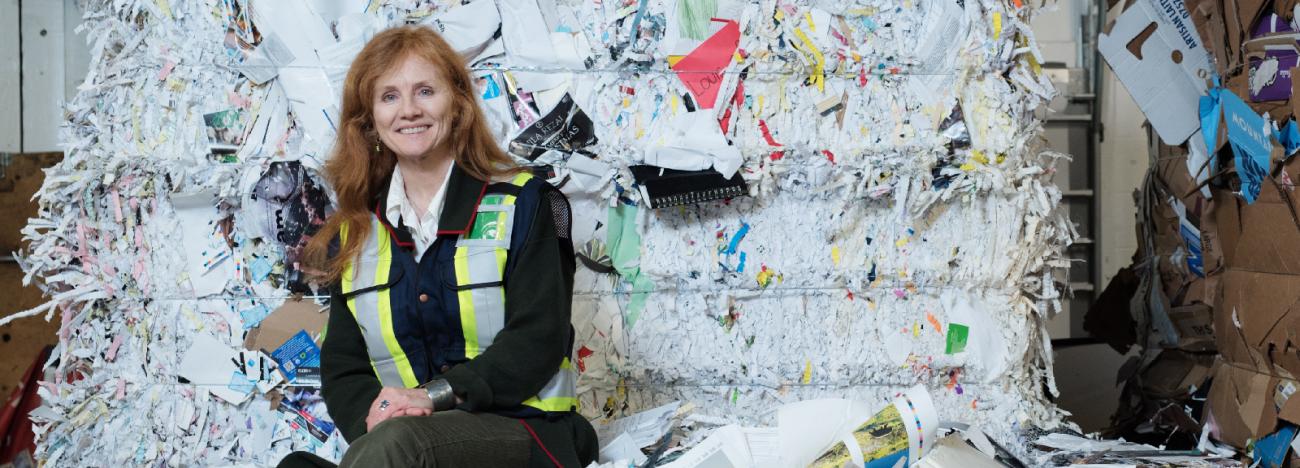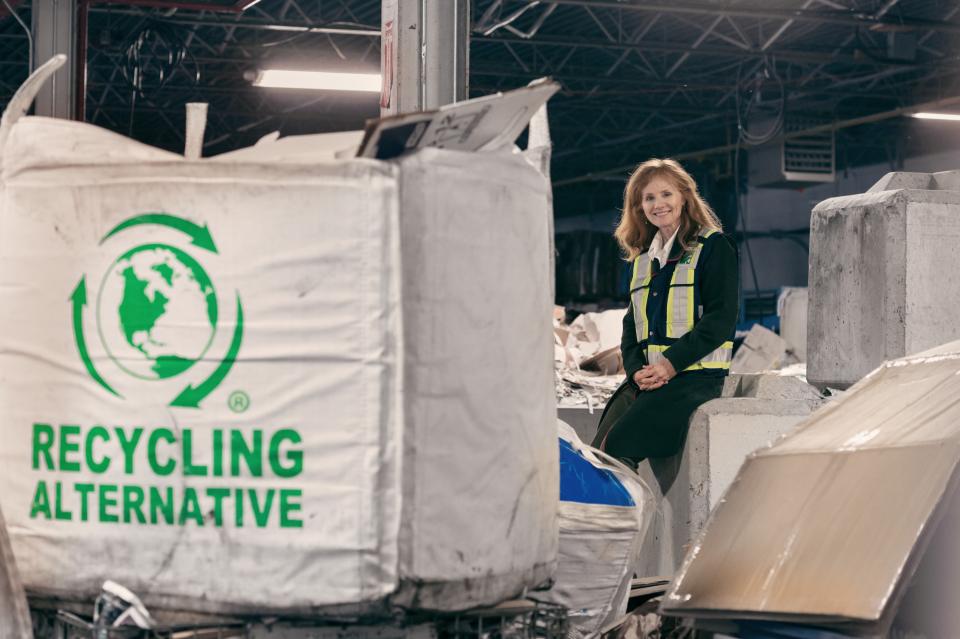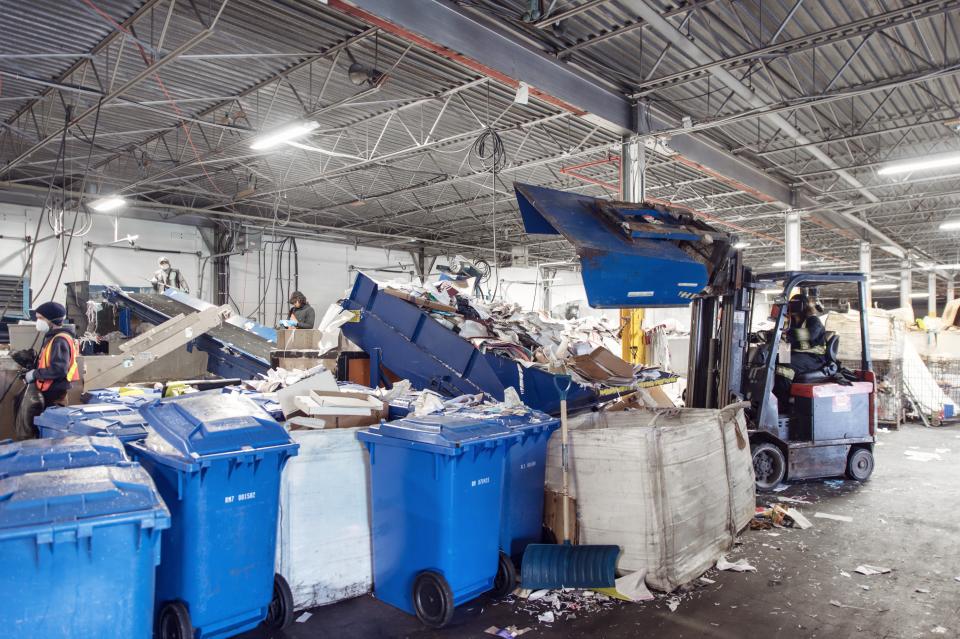Sorting it Out
It was late summer in 1988. Back then, sustainability was a little-used word in the Canadian Oxford, blue boxes were a rare sight, and the toxic soups dished up by landfills had gained little of the notoriety they deserve. Like most of the people she knew, Louise Schwarz, BA’83, hadn’t given a second thought to what becomes of the trash we throw away.
But on that September day, she was visiting her friend JoJo in Seattle, who was “a greenie” and ahead of the curve. JoJo pointed out a green bin she’d placed outside her apartment. “I’ve got all the people in the building doing recycling,” she remarked, “so we’re not just throwing it all away.”
Schwarz, who had just returned to Vancouver after several years teaching ESL in Europe, was not attuned to environmental issues. Although she had started noticing some things – the way people still smoked in hospitals in Italy, for example, and how crowded some cities were becoming – not once had she ever considered the life cycle of garbage.
But when JoJo spoke that day about the concept of recycling, a realization hit Schwarz “like a ton of lead bricks”: when we throw garbage “away” it is out of sight and out of mind, but all we are really doing is shifting its location. Once garbage, always garbage. And what starts out as a seemingly manageable pit of refuse gets added to and added to, until it becomes a mountain of toxic metals and stinking, germ‑infested rot – quite possibly near someone else’s home – filling up space and sucking clean air from people and animals and plants. The more she thought about it, the more her head reeled.
Over the next few months, Schwarz couldn’t shake the nagging conviction that she had to take on this garbage monster. “I cannot be a person who stands on the sidelines and says, ‘Oooh, it’s a big mess, and I can’t do anything to change anything’,” she says.
At the time, one of her brothers was running a courier business. When she observed the “sheer volume of envelopes” going into his garbage, she knew this was something she could tackle: she could recycle office paper. She sent out a letter to commercial enterprises, offering to collect their paper trash for the bargain basement price of a few dollars a load, “depending on frequency.” She picked her fee out of thin air, she laughingly admits, but she knew of no other service like it on which to base her numbers. The letter itself was simple and direct. The welfare of the environment “is the most pressing issue we face today,” it said, and it went on to extol recycling as “a necessary alternative to the ever‑growing problem of our waste.”
The phone started ringing, and Schwarz’s little non‑profit social enterprise was born. She called it Recycling Alternative. To begin with, it was just Schwarz alone, picking up paper trash in her Chevy Chevette hatchback, but the venture soon graduated to needing a van, and Schwarz was joined by her business partner, Robert Weatherbe.
To begin with, it was just Schwarz alone, picking up paper trash in her Chevy Chevette.
The company switched into full gear as a for‑profit business in 1998. Today, they boast a fleet of 20 vehicles, fueled – whenever possible – with recycled biodiesel, and they service a wide variety of commercial clients, from offices to shopping malls, restaurants, large apartment buildings, and even YVR.
In addition to paper, they sort, bale, and deliver soft plastics and cardboard for recycling; they collect e‑waste, batteries, lights, and Styrofoam, and disseminate these to the appropriate processing specialists; they shred highly sensitive documents for business and residential clients; and, every day, they collect, aggregate, and deliver tons of food waste for composting.
Always concerned about the impact of their fleet’s carbon footprint, Weatherbe designed a special vehicle they fondly call the “Zero Waste” truck. It has an engine smaller than usual for a vehicle its size and bears three distinct waste compartments. One Zero Waste truck can do the complete rounds of a pickup route and return to the depot having collected three totally separate recycling streams in a single pass.
For a high‑volume enterprise such as a convention center or an airport facility, having one of these composting systems on site means they can scale down from their daily (and often twice‑daily) organics pickups to just one collection per week. Not only would this help them slash their waste‑disposal costs, but the reduced frequency of pickup would mean a lot less CO2 is being emitted by garbage trucks. Another advantage is no longer having to contend with smelly garbage awaiting pickup and tempting rats, mice, and other vermin to the feast.
Near one end of the facility, Weatherbe has a whole row of these composters and is conducting further experiments to see how they handle plastics. Nobody wants plastics in their compost and, in any case, current binning protocols require that the entire bin has to go to a landfill if plastics such as sandwich wrappers or sushi trays happen to get dumped in along with the banana peels and other food waste, “so we wanted to test what happens if we threw in packaged food – hummus… a tray of sushi,” says Schwarz. “What we’ve discovered is the heat in this machine helps break open and coagulate the plastic. The microbes go in and start eating the food, and then it’s so much easier to sift out.” They run the mix through a tumbler to catch the macro‑plastics, then centrifuge what’s left to separate out the micro‑plastics. “Bear in mind, this is experimental,” Schwarz cautions, “but the goal is a nutrient‑rich compost tea.” The UBC scientists are keen to test this end product as well, when it is ready.
The company’s focus has always been recycling, Schwarz says, but what sets them apart is their innovative approach to waste reduction, and their integrative approach to helping clients improve their own recycling infrastructure. For example, they help educate clients so they can choose more environmentally‑friendly product lines, meaning less of their waste must go to a landfill. And long before the City of Vancouver banned the dumping of organics in regular garbage, Recycling Alternative was heavily invested in exploring new ways to effectively reduce clients’ organic waste.
Recycling Alternative is, at heart, a community‑building enterprise, and it enjoys sharing space, as well as values such as inclusive employment, with its Green Hub neighbour, United We Can.
On the depot floor there’s a constant ebb and flow of workers. Members of the binner community stream in with shopping carts overladen with refundable bottles and cans, and leave with empty carts and the day’s earnings in their pockets. A fair portion of the mountains of pop cans and beer and wine bottles they bring in would have ended up in landfill if the binners hadn’t retrieved them. The binners belong here. They are an integral part of this co‑location business community, initially envisaged by Schwarz and Weatherbe and proposed to the City many years ago. Recycling Alternative and United We Can each has their own separate lease agreement with the City for their respective portion of the 30,000 square‑foot depot, but there is a notable absence of walls and a striking warmth of spirit.
Crossing the warehouse floor, Schwarz and the binners greet each other by name. Schwarz is in her element. “When I integrate, it does something to me. It changes who I am,” she says. “And I want my staff to be a part of this. It opens up their world and their heart, too, to integrate, and to understand that we are all one. Integration is so important. We’re just all the same, all the same.”


































